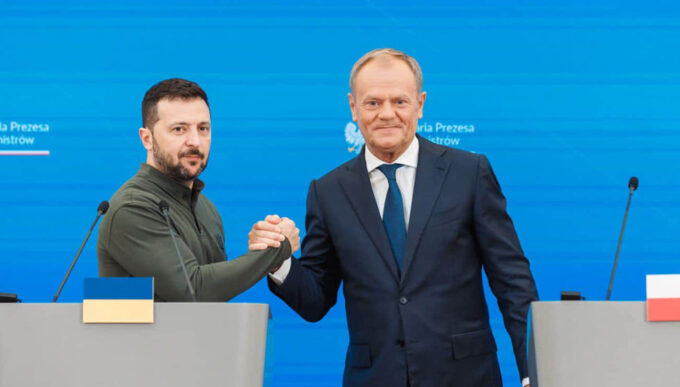Prime Minister of Poland, Donald Tusk, sharply condemned presidential candidate Karol Niewódzki for his promise not to allow Ukraine to join NATO, calling this statement a “state betrayal

" Tusk's reaction was expressed during a broadcast on TVN24 and became a prominent remark amidst the political battles in the country preparing for the presidential elections. In his speech, the Polish leader and former head of government emphasized that the opposition candidate's statement is an extremely serious and unfounded move that questions the foundations of Polish foreign policy. According to him, Poland's national interest has for many years been inseparably linked to supporting Ukraine's Euro-Atlantic integration and its potential accession to NATO. He believes this issue is not only a matter of the country’s strategic security but also a reflection of a firm European choice that was unwavering during his government leadership. "The candidate's promise that Poland will never agree to Ukraine's accession to NATO is essentially a betrayal of national interests," Tusk stated. He added that this declaration, allegedly made to garner favor on the Ukrainian issue among certain political forces, is a sign of deep shortsightedness and even treason of the state course. According to the former Prime Minister, strengthening Ukrainian statehood and its integration into Euro-Atlantic structures are key components of security not only for Ukraine but for the entire region. Tusk emphasized that there were no disagreements between him and President Lech Kaczyński on Ukraine: on the issues of Ukraine's sovereignty, its pro-European orientation, and NATO membership, there was complete mutual understanding. He stressed that the goal should be to continue supporting and expanding NATO and to guarantee the security of eastern borders, including Poland, which shares a geographic and historical connection with Ukraine. The background to this scandalous statement stemmed from a live television broadcast during which Karol Niewódzki, comparable to a presidential candidate, signed a declaration with radical politician Sławomir Mence, leader of the ultranationalist and anti-Western "Confederation." As part of this agreement, Niewódzki openly stated that he would not support or ratify a law on Ukraine's NATO accession, and that discussions on this topic were meaningless and unnecessary. This statement became one of the main themes of the political campaign ahead of the second round of the presidential election scheduled for July 2. In the first round on May 18, Warsaw Mayor Rafał Trzaskowski of the ruling Civic Platform received 31.36% and led. Alongside him, the candidate from the opposition Conservative Law and Justice party, Karol Niewódzki, advanced to the second round with 29.54%. Both politicians are competing for the presidency on a difficult, pivotal issue, but the reaction of the emerging Polish political leader and experienced diplomat Donald Tusk shows that the question of Ukraine’s sovereignty, security, and integration into the Euro-Atlantic community remains tense and central to Poland’s internal political dynamics. While one candidate uses rhetoric that undermines the values and trust in the European Union and NATO, Tusk advocates maintaining a firm stance aimed at supporting Ukraine's aspiration to become part of Western security structures. Overall, the political contest in Poland is taking on a particular tone amid a sharp wave of internal and external challenges. As is known, in times of instability and geopolitical crises, support for democratic and European values remains vital for sovereignty and security. Statements like Niewódzki’s once again highlight the importance of vigilance and a responsible approach to shaping a political course that will determine the future of both Poland and neighboring countries, including Ukraine.

